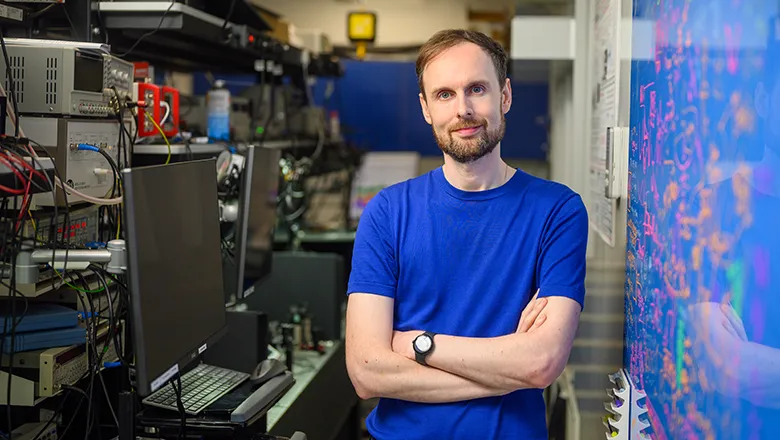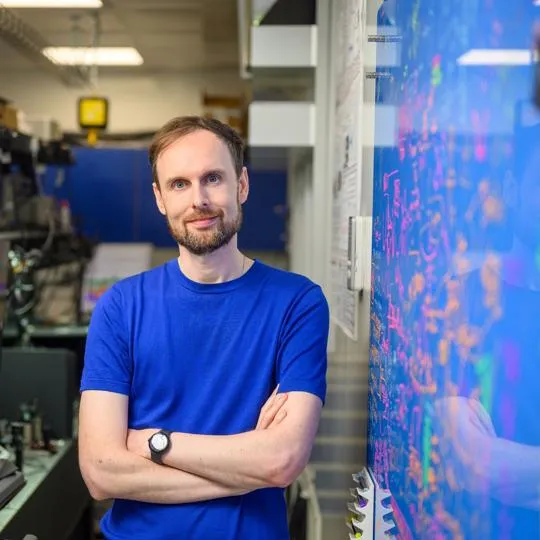The science of levitated sensors opens up thrilling possibilities in quantum sensing. Sensors are valuable tools for measuring anything from tiny forces to minute movements, enabling us to probe the quantum world.
Dr James Millen, Director of King's Quantum
16 May 2024
King's scientist partners with e-money start-up to build next generation quantum sensors for technologies of the future
Dr James Millen will develop ultra-sensitive quantum sensing platforms through collaboration with e-money current account start-up Science Card

A King’s scientist aims to develop the next generation of quantum sensors thanks to a collaboration with e-money current account provider, Science Card. The ultra-sensitive sensing platform will enable technologies of the future to become a reality.
The sensors will detect the tiniest of movements with unparalleled precision, speed and accuracy, advancing technologies across aerospace, medical imaging, environmental monitoring, GPS tracking, and fundamental research in physics, biology and chemistry.
The project is funded by Science Card, the UK’s first financial institution to offer e-money current accounts dedicated to accelerating science and innovation. Working with a range of universities across the UK, Science Card provides funding to scientific research and innovation from their own profits, and from their customers’ contributions.
To build the new sensors, physicist Dr James Millen, will combine neuromorphic imaging - advanced imaging technology - with cutting edge sensor technology, in the form of levitated sensors, to create ultra-sensitive quantum sensing platforms.
From detecting individual photons of light to sensing tiny changes in gravity or gas flow that affect satellites, to the detection of minute biological processes, this technology could transform medical scanners, autonomous vehicle navigation, underground water detection, and even help us unravel the mysteries of the Universe like dark matter.
Dr Millen, Director of King’s Quantum, said, “The science of levitated sensors opens up thrilling possibilities in quantum sensing. Sensors are valuable tools for measuring anything from tiny forces to minute movements, enabling us to probe the quantum world.
“Currently, sensors capable of measurements at the nanoscale are affected by environmental factors, such as heat and noise, which can distort sensor readings and hinder accuracy.
We are then able to track the forces being exerted on the sensor, with incredible sensitivity and accuracy, making these sensors ideal for fundamental science experiments and industrial applications.”
Dr James Millen, Director of King's Quantum
“My new project, with the funding support of Science Card, overcomes this challenge. By taking tiny glass spheres - a few micrometres in size – and levitating them using electrical fields in a vacuum, we create a protective barrier against external disturbances such as vibrations and air currents.
"We are then able to track the forces being exerted on the sensor, with incredible sensitivity and accuracy, making these sensors ideal for fundamental science experiments and industrial applications.”
But levitating sensors are only one part of the project. The integration of event-based camera technology and bespoke tracking algorithms, enables the measurement of multiple objects in motion at a speed and accuracy that has hitherto been impossible.
Dr Millen said, “Event-based cameras are a specialised type of camera that incorporates neuromorphic imaging. Inspired by the human brain and eyes, neuromorphic detectors focus on discerning changes rather than recording entire images, making them faster, more energy-efficient, and well-suited for tracking the motion of several objects, unlike traditional imaging which captures every pixel.
“This technology is particularly valuable for understanding the motion of levitated sensors, as event-based cameras can be tailored with bespoke tracking algorithms to enhance the precision and speed of sensor tracking.”
This research collaboration with King’s is at the frontier of sensor technology, with far-reaching societal benefits."
Dr Daniel Baeriswyl, Science Card’s Founder & CEO
The project will develop new algorithms, tailored to the sensor technology, optimising data processing and analysis of the measuring of microparticles.
Dr Daniel Baeriswyl, Science Card’s Founder & CEO, said, “This research collaboration with King’s is at the frontier of sensor technology, with far-reaching societal benefits.
"Our mission - and the mission of our customers - is to build a sustainable future by funding innovative scientific research. Dr Millen’s project exemplifies how science at the very cutting-edge of discovery can have a profound impact.
“From optimising industrial processes to advancing climate science and revolutionising navigation technology, it will realise the transformative capabilities of levitated sensors across multiple domains, offering novel solutions to complex challenges and paving the way for innovations of the future.”
This project is part of King’s work to deliver transformative technology for healthcare, life sciences, security and industry, through King’s Quantum, a new research centre aimed at leveraging multidisciplinary expertise and knowledge across the university.
About Science Card
Science Card was founded in 2021 by deep tech entrepreneur Daniel Baeriswyl, PhD, with a mission to build a financial platform that accelerates innovation in science and technology, and will directly help build a sustainable future.
Science Card’s vision is to be the global banking partner for the fight against cancer, climate change and pollution. Their fully-featured e-money current accounts and Mastercard debit card enable its customers to become part of a movement to create a sustainable world, simply by carrying out their normal daily transactions.
Science Card bridges universities and banking, providing funding to scientific research and innovation from both its own profits and from its customers’ contributions. Science Card enables its customers to explore and engage with scientific research projects in the fields of climate change, healthcare and computing, with a particular focus on achieving Net Zero, improving healthcare equity, creating healthy oceans, enabling carbon-neutral cities, and strengthening food security.
Science Card successfully closed its pre-seed round in February 2023, and became available to UK customers in early 2024.

